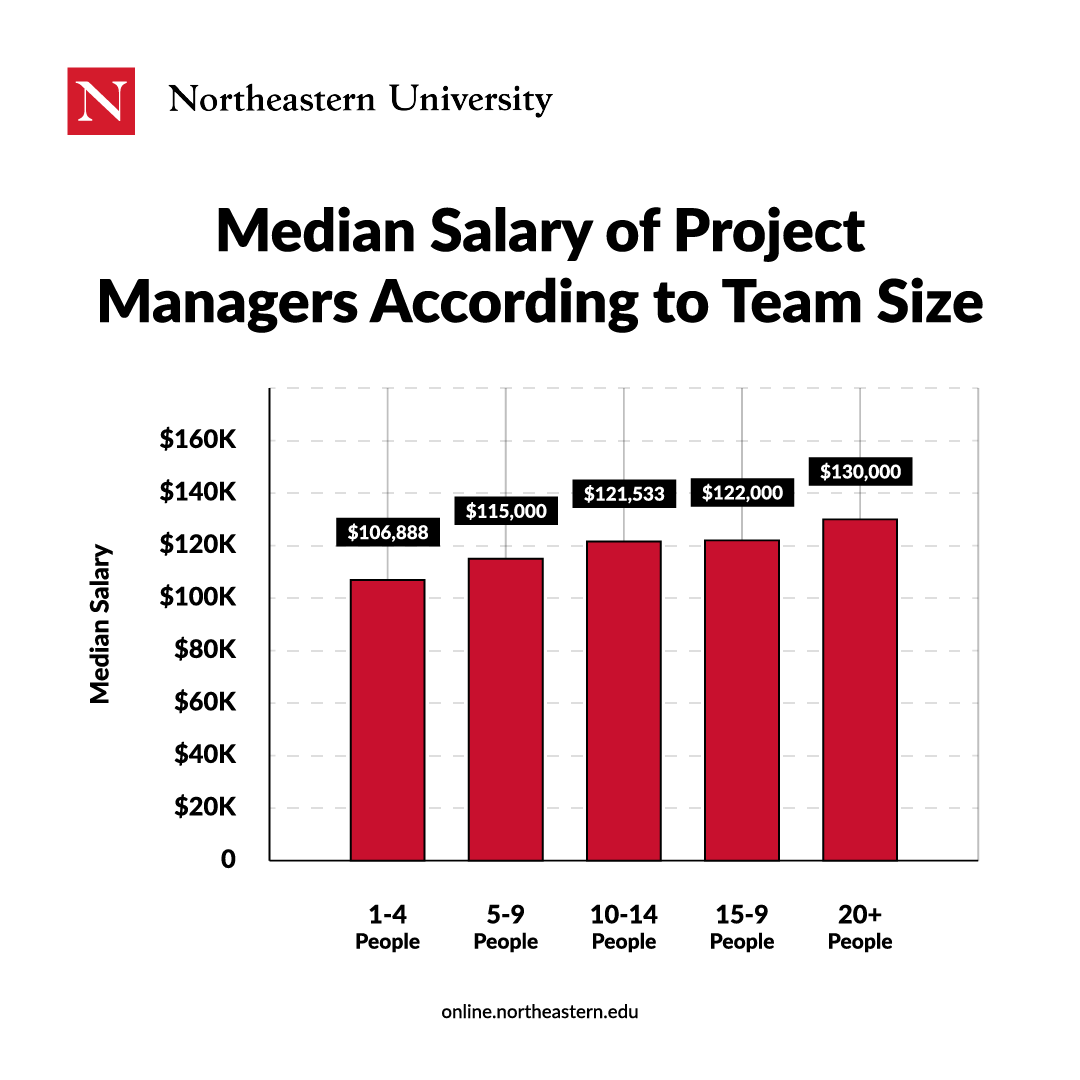By seeing strategic projects from inception to completion, project managers can reduce company costs, increase organizational efficiencies, and help generate higher revenues.
Fortunately, the importance of the project management function isn’t lost on company leaders. Ninety-seven percent of organizations strongly agree that project management is critical to the success of their company—and they’re willing to pay for it.
How Much Does a Project Manager Make?
In the U.S., the median salary for project managers is $116,000 across all industries, with most project managers earning between $93,000 and $140,000.
Exactly how much a project manager makes, however, depends on several key factors, including a manager’s level of education and experience, team size, region, and the company’s industry.
Are Project Managers Still In Demand?
Project managers are essential in successfully completing projects on time and on budget. Since they possess the ability to plan, organize, and lead teams—along with effective communication and problem-solving skills—they are invaluable to all industries and sectors. As a result, the demand for project managers is expected to rise as organizations recognize their value.
In fact, PMI projects that employers will need nearly 88 million individuals in project management-oriented roles by 2027.
Knowing the great demand for project managers, take a deeper dive into how these six factors can add more money to a project manager’s paycheck.
Download Our Free Guide to Advancing Your Project Management Career
Learn what you need to know, from in-demand skills to the industry’s growing job opportunities.
Six Factors that Increase a Project Manager’s Salary
1. A Project Management Certification or Graduate Degree
Earning a certification or advanced degree can significantly increase your salary as a project manager.
PMP Certification
Becoming a certified project manager not only helps you enhance your salary, but it demonstrates to employers that you have the skills and knowledge to manage projects and teams successfully.
A global study found that professionals with a PMP certification earn 22 percent more on average than those without one across all countries and industries. In the U.S., a project manager with a PMP certification makes $120,000 annually as compared to $95,000 without one.
A PMP certification is often preferred or recognized for promotions and career advancement. The certification is earned through the Project Management Institute, a globally-recognized association that promotes collaboration, education, and research within project management. The organization also maintains international certification standards, credentialing, policies, and procedures.
Master’s Degree in Project Management
The benefits of a master’s degree in project management are twofold. For one, project managers with master’s degrees earn a median salary of $120,000 compared to $110,250 for those with bachelor’s degrees.
Even more compelling, however, is that 34 percent of all project management jobs now prefer or require a graduate degree, according to a report by Burning Glass Labor Insight. Earning a master’s degree in project management will not only increase your salary but also your marketability. A strong graduate program can equip you with the specialized skills and hands-on experience you need to lead complex projects and advance your career.
2. Years of Experience
As with most jobs, the amount of work experience you have will impact how much money you’ll make as a project manager. For example, project managers in the United States with more than 20 years of project management experience earn a median annual salary of $135,000 compared to $83,000 for those with less than three years’ industry experience.
3. Specialization
Your project management salary can also increase depending on your area of specialization within the discipline. For example, you may choose to specialize and become a program manager or portfolio manager.
Here’s how the three roles break down, based on annual salary by position description:
- Project managers plan, direct, and close projects by determining responsibilities, creating inclusive plans, and managing budgets. They typically make an average salary of $91,245.
- Program managers execute several related projects in a collective way—also known as a program—to improve a company’s outcomes, and they command an average salary of $127,517.
- Portfolio managers analyze an organization’s projects to help companies identify the best tasks, distribute the right resources, and improve project performance. They earn an average salary of $140,780.
Alternatively, specializing in a particular project management methodology that is in particularly high demand can also help to increase your salary.
4. Project Team Size
Team size also affects a project manager’s income. Depending on the size of the team, a project manager could earn an additional $25,000 per year. According to the Project Management Institute, median salaries in the U.S. by team sizes are as follows:
1-4 people: $106,888
5-9 people: $115,000
10-14 people: $121,533
15-19 people: $122,000
20+ people: $130,000

Project managers also make up to 40 percent more if they are managing initiatives with budgets exceeding $10 million.
5. Industry
The industry a project manager works in can have a significant impact on yearly earnings. According to the Project Management Institute, project managers in the following industries report the highest median income in the nation:
Resources (Agriculture, Mining, etc.): $134,577
Consulting: $134,149
Pharmaceuticals: $133,246
Aerospace: $129,732
Food and Beverage: $124,559
Engineering: $124,434
Utilities: $122,255
Information Technology: $122,245
Project management salaries within the science, technology, engineering, and math (STEM) fields are especially high due to the rapid growth and demand in these industries. In fact, 93 percent of STEM jobs offer wages well above the national average, and the national median salary for all STEM positions is almost double the average wage for non-STEM roles.
In top-paying project management industries such as the government, projects are more complex and often require specialized knowledge of particular software, making project management salaries higher than average.
6. Location
Where you physically choose to work can also affect your salary, within the U.S. and worldwide. Nationwide, the average project manager salary by location is:
San Francisco: $91,318
Houston: $82,119
Seattle: $78,693
New York City: $79,231
Boston: $78,852
Chicago: $76,329
Charlotte: $73,899
Worldwide, the countries where project managers report the highest median salaries are: Switzerland, the United States, Australia, Germany, and The Netherlands. According to the Project Management Institute, project managers in these countries earn a median salary of:
Switzerland: $132,086
United States: $116,000
Australia: $101,381
Germany: $96,987
The Netherlands: $93,839
Where you work can have a huge impact on earnings, in addition to your education, experience, specialization, project team size, and industry. Project managers should consider these factors when considering their potential salary and career growth.
Taking Control of Your Earning Potential
From education to specialization, project team, industry, and location, there are many factors that go into influencing the salary that you might earn as a project manager. While you can exert a certain amount of control over many of these factors, the one that is most in your control is the first one: your education.
If you are considering a master’s degree in project management, it’s important to evaluate your options before committing to a program so you can be sure the one you choose aligns with your personal and professional goals.
Some questions to consider include:
- Will the program provide opportunities for hands-on, experiential learning that employers want?
- Does the program offer a concentration for the industry you hope to work in?
- Will the program cover specific methodologies you are interested in?
- Is the curriculum taught by industry-embedded professionals with experience working in the field?
- Will the program structure offer the flexibility you need to pursue your degree while working?
Northeastern’s Master of Science in Project Management embodies all of these features, making it a popular choice for professionals seeking to advance their career in project management.
To learn more, download our free guide below.
Editor’s note: This article was originally published in September 2017. It has since been updated for accuracy.







Related Articles
Master’s in Project Management or an MBA: What’s the Difference?
6 Project Management Trends Emerging in 2023
Master’s Degree Comparison: Sports Leadership vs. Sports Management